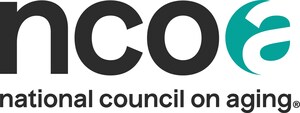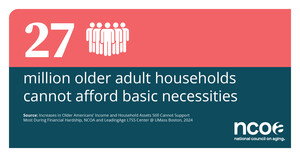Senate Refuses to Balance the Budget on the Backs of Vulnerable Older Americans
Vote Rejects Concept of Slashing Senior Service Programs
WASHINGTON, March 10, 2011 /PRNewswire-USNewswire/ -- The Senate has rejected House legislation (H.R. 1) that would have cut or eliminated programs designed to help older Americans sustain their economic independence and health.
(Logo: https://photos.prnewswire.com/prnh/20100615/NCOALOGO)
H.R. 1 included:
- A $525 million cut in job training and placement for low-income seniors under the Senior Community Service Employment Program (SCSEP)
- A $551 million cut in the Section 202 Supportive Housing for the Elderly program
- A $390 million cut in the Low-Income Home Energy Assistance Program (LIHEAP)
- A $305 million cut in the Community Services Block Grant (CSBG) program
"H.R. 1 includes drastic cuts in housing, heating, and jobs for vulnerable older Americans," said Jim Firman, president and CEO of the National Council on Aging (NCOA): "We must reject attempts to make life even worse for our nation's poorest seniors."
The Senate also regrettably failed to adopt a reasonable alternative to H.R. 1. The Senate bill would have protected investments in the aging services that were cut in the House bill and provided needed increases to senior meals program and Social Security.
NCOA urges both the House and Senate to protect senior programs, especially for the 13 million older Americans who live below 200% of the federal poverty level, with incomes below $22,000 for singles and about $29,000 for couples.
Specifically, NCOA is concerned about cuts in the Senior Community Service Employment Program, the only major jobs program targeted specifically to helping disadvantaged older adults who need to remain in or return to the workforce to avoid financial crisis. SCSEP serves those with extremely low incomes, and the cut would result in the loss of over 83,000 part-time jobs.
"Congress should be focused on finding ways to help older Americans, not trying to cut desperately needed programs used by those who need them most," said Firman. "These people aren't asking for anything special, they just want to survive and age with dignity."
Employment and benefits are important pieces of the puzzle for older adults who are living on the edge of poverty. NCOA is committed to helping older adults build greater economic security and offers a variety of other resources, including:
- NCOA's Economic Security Service Centers provide low-income older adults with one-on-one economic casework at 12 locations nationwide.
- The Senior Environmental Employment (SEE) program provides an opportunity for retired and unemployed older Americans aged 55+ to share their expertise in jobs for the U.S. Environmental Protection Agency.
- Home Equity and Reverse Mortgage Counseling helps millions of seniors make prudent use of their equity so they can "use their home to stay at home."
- BenefitsCheckUp.org is a free online screening tool that searches over 2,000 federal, state, local, and private programs to help seniors pay for prescription drugs, utility bills, meals, health care, and other needs.
For more information on NCOA's programs, please visit www.ncoa.org.
About NCOA
The National Council on Aging is a nonprofit service and advocacy organization headquartered in Washington, DC. NCOA is a national voice for older Americans - especially those who are vulnerable and disadvantaged - and the community organizations that serve them. It brings together nonprofit organizations, businesses, and government to develop creative solutions that improve the lives of all older adults. NCOA works with thousands of organizations across the country to help seniors find jobs and benefits, improve their health, live independently, and remain active in their communities. For more information, please visit www.NCOA.org.
SOURCE National Council on Aging
WANT YOUR COMPANY'S NEWS FEATURED ON PRNEWSWIRE.COM?
Newsrooms &
Influencers
Digital Media
Outlets
Journalists
Opted In






Share this article